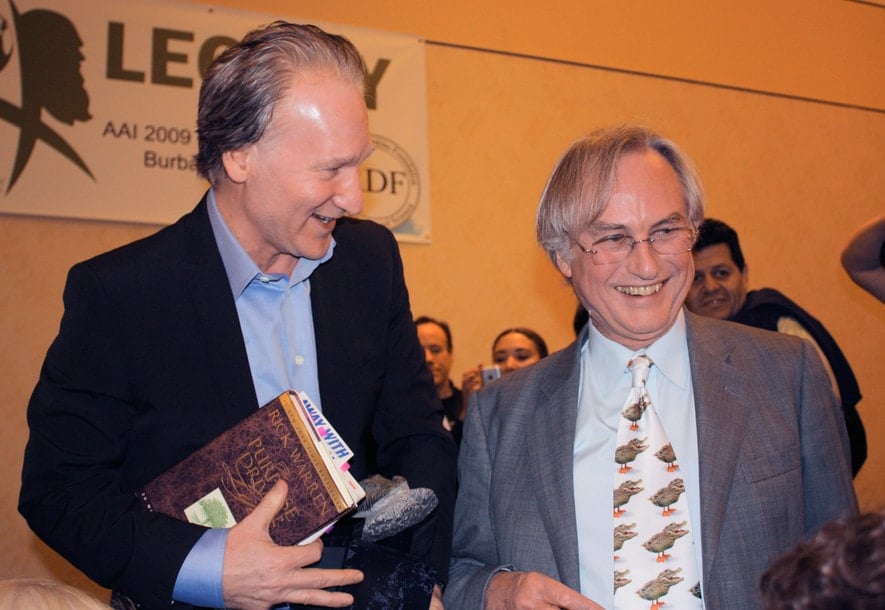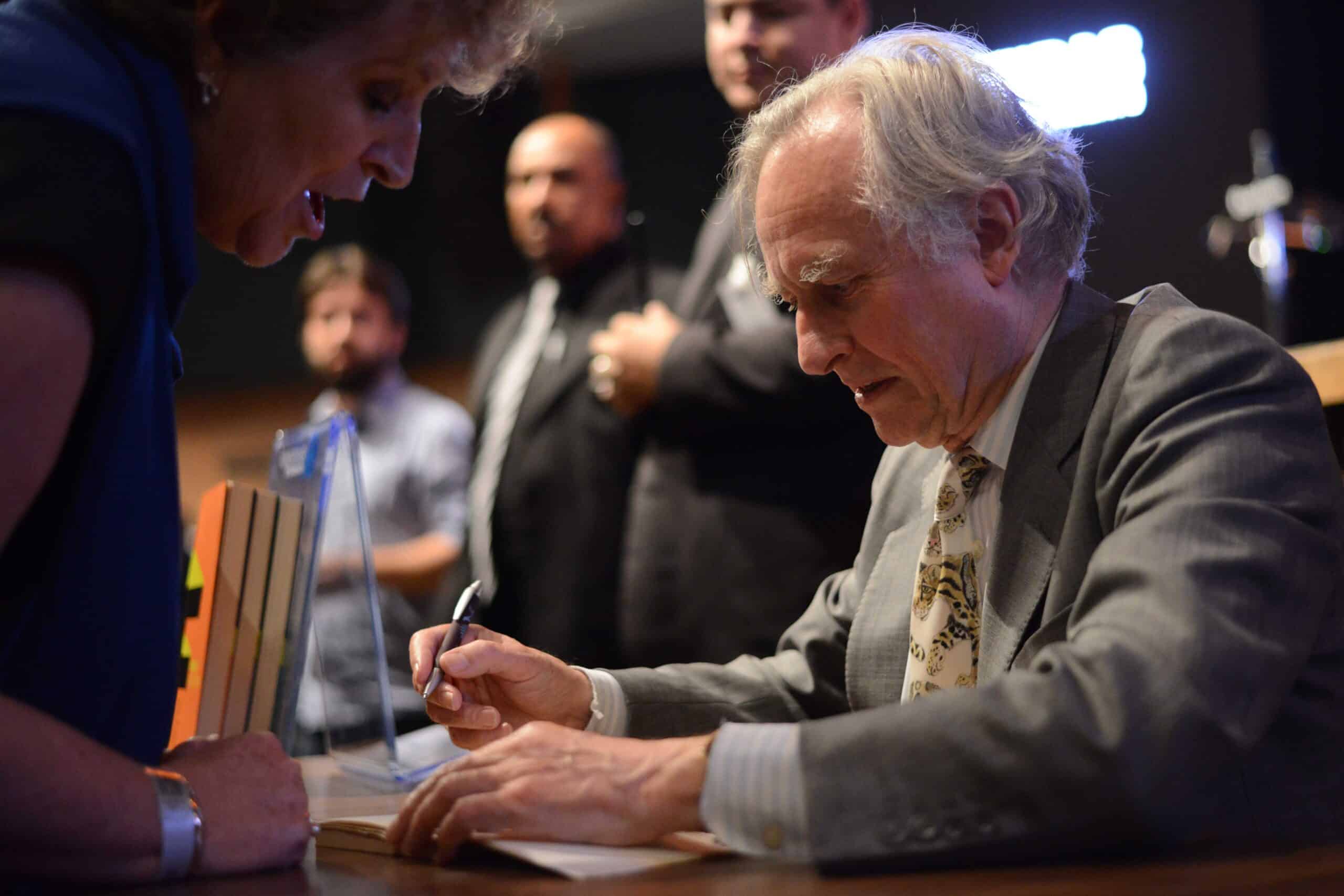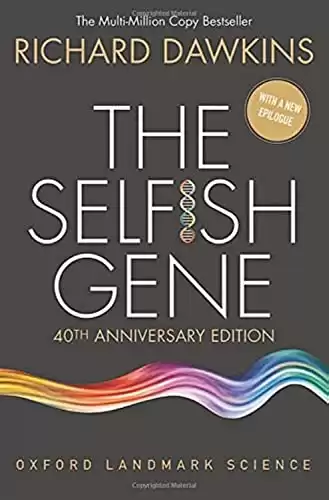Richard Dawkins coined the term “meme,” but he’s most well-known for his views on science and religion. Although Dawkins’ beliefs often stir controversy, his intelligence and influence cannot be denied, placing him among the top minds of our time.
In this article, we’ll take a look at Richard Dawkin’s IQ and explore the factors that contribute to his esteemed reputation.
Quick Facts
- Full Name
- Richard Dawkins
- Birth
- March 26, 1941
- Net Worth
- $10 million
- Awards
- Silver Medal of the Zoological Society of London
- Michael Faraday Prize
- International Cosmos Prize
- Nierenberg Prize for Science in the Public Interest
- Fellowship of the Royal Society
- Children
- 1
- Nationality
- British
- Place of Birth
- Nairobi, Kenya
- Fields of Expertise
- Evolutionary Biology
- Institutions
- University of Oxford
- Contributions
- Selfish Gene Theory
Richard Dawkins’ IQ
Experts estimate that Richard Dawkins’ IQ is 165.
To put this in perspective, Albert Einstein‘s IQ is estimated to be 160, 5 points less than Dawkins’. With the average IQ score ranging from 85 to 115, Dawkins’ IQ would put him in the top 0.001% of the population.
Notably, Dawkins has never released the results of an IQ test. Nonetheless, experts have estimated his IQ based on his work and contributions.
What Makes Richard Dawkins So Smart?
Dawkins possesses certain qualities that indicate high intelligence. Let’s explore this in further detail.
Clear Communication
Dawkin’s ability to articulate complex concepts in a way that is easy to understand is a testament to his intellectual abilities. For example, in his book, The Selfish Gene, Dawkins introduces the concept of gene-centered evolution. Although the subject matter is fairly complex, he makes it accessible even to those without a scientific background.
This skill has amplified his reach to a global audience, further cementing his place as one of the most influential thinkers on the world stage.
- Written by Professor Richard Dawkins
- Explores a "gene's eye view of evolution"
- Includes a new epilogue from the author discussing the relevance of these ideas in evolutionary biology today, original prefaces and foreword, and early reviews
Intellectual Curiosity
One of the hallmarks of a brilliant mind is intellectual curiosity. While some may blindly accept widely held beliefs, Dawkins strives to uncover their rationale. This makes him not only highly intelligent but also well-informed.
Armed with such a wealth of knowledge, Dawkins is able to ask even more thought-provoking questions.
Willingness to Engage Opposing Views
Many of Dawkins’ beliefs are highly controversial as they go against traditional norms. Despite criticism surrounding his views on science and religion, Dawkins remains committed to engaging with opposing viewpoints. He has responded to critiques with well-reasoned arguments, emphasizing open and respectful dialogue over confrontation.
This commitment to thoughtful discourse showcases his emphasis on intellectual exchange in the pursuit of truth.

Although Richard Dawkins and Neil deGrasse Tyson disagree on many topics, they frequently meet to engage in public discussions.
Is Richard Dawkins the Smartest Person Ever?
Richard Dawkins is undoubtedly a highly intelligent and accomplished individual, particularly in the field of evolutionary biology.
However, there have been many brilliant minds throughout history who have made significant contributions to various disciplines, such as Albert Einstein in physics, Leonardo da Vinci in art, and Marie Curie in chemistry. Since intelligence can take many forms, it’s not accurate or fair to label any individual as the “smartest person ever.”
Nonetheless, based solely on IQ, individuals like Isaac Newton and Alan Turing do outscore Dawkins.
About Richard Dawkins
Early Life
Richard Dawkins was born in Nairobi, Kenya on March 26, 1941, where his father, Clinton John Dawkins, was stationed during World War II. At the age of 8, Dawkins’ family returned to England when his father received an inheritance from a distant cousin whom he had never met. Although the inheritance included a gentleman’s estate, the Dawkins family ran it as a commercial farm since they did not have the financial means to keep it for leisure.
During his childhood, Dawkins embraced Christianity, believing that the world was too complex to exist without a creator. However, he began questioning his religious beliefs as a teenager, eventually deciding that it was more logical to accept the theory of evolution than to believe in God.

Education
After Dawkins’ family returned to England, he attended Oundle School which was guided by the ethos of the Church of England. Much to his teachers’ disappointment, Dawkins read Why I Am Not a Christian by Bertrand Russell. As a result, Dawkins became even more committed to his atheist beliefs.
Upon graduating from Oundle School, Dawkins studied zoology at the University of Oxford. During this time, Nikolaas Tinbergen, a biologist and Nobel Prize winner, became Dawkins’ tutor and mentor. This relationship left a lasting impact on Dawkins and laid the groundwork for his future work in evolutionary biology.
Rise to Prominence
After nearly 20 years as an esteemed university professor, Oxford created a special position for Dawkins in 1995: the Simonyi Professorship. In this position, Dawkins would be expected to advance the public understanding of science. This role was pivotal for Dawkins because it specifically encouraged him to get out of the university setting to promote scientific exploration.
Eagerly embracing his new role, Dawkins began taking more public engagements. While he frequently met with well-known scientists, such as Neil deGrasse Tyson and Bill Nye, Dawkins also engaged with diverse, high-profile media personalities like Bill Maher, Piers Morgan, Jordan Peterson, Ricky Gervais, and Russell Brand.
Because of Dawkins’ courteous approach to discussion, these interactions engaged people with opposing viewpoints. Furthermore, Dawkins asked questions that were relatable and thought-provoking, giving the public an avenue to explore topics they might not traditionally explore.

Dawkins’ Beliefs
Atheism
Dawkins argues that there is a lack of empirical evidence to support the existence of God or any other supernatural entity. He emphasizes the importance of using the scientific approach to shape beliefs and expresses skepticism toward religious claims that require faith as their foundation.
According to Dawkins, we do not need to attribute the existence of life to a divine creator. Instead, he suggests that the gradual process of evolution by natural selection logically explains the emergence of humans and other life forms.

Gene-Centered Evolution
The theory of gene-centered evolution states that genes are responsible for how all life behaves. Furthermore, the main mission of genes is to ensure their replication. Due to natural selection, traits that enhance an organism’s survival and reproduction are more likely to be passed on to the next generation.
Lessons from Richard Dawkins’ Life
Regardless of your opinions, Dawkins’ dedication to pursuing and sharing knowledge is admirable. His example highlights that knowledge flourishes when you actively engage in meaningful discussions with individuals who hold diverse perspectives.
Notably, people who hold totally opposite views from Dawkins find him pleasant to debate. While Dawkins doesn’t always convert people to his point of view, he commands respect for his gentle manner and logical thought process.
Dawkins’ journey reminds us that, while disagreements may persist, respectful conversations can lead to mutual understanding and even personal (and collective) growth.
Up Next:
If you’d like to learn more about other influential individuals, we recommend checking out these articles:
- What is Jeff Bezos’ IQ? Is He the Smartest Person Ever?
- What was Charles Darwin’s IQ? Was He the Smartest Person Ever?
The image featured at the top of this post is ©Fronteiras do Pensamento / CC BY-SA 2.0 .


